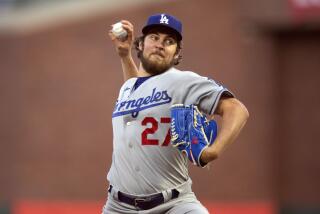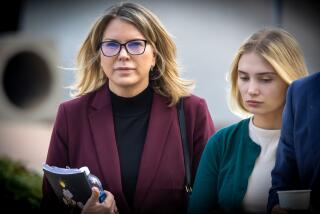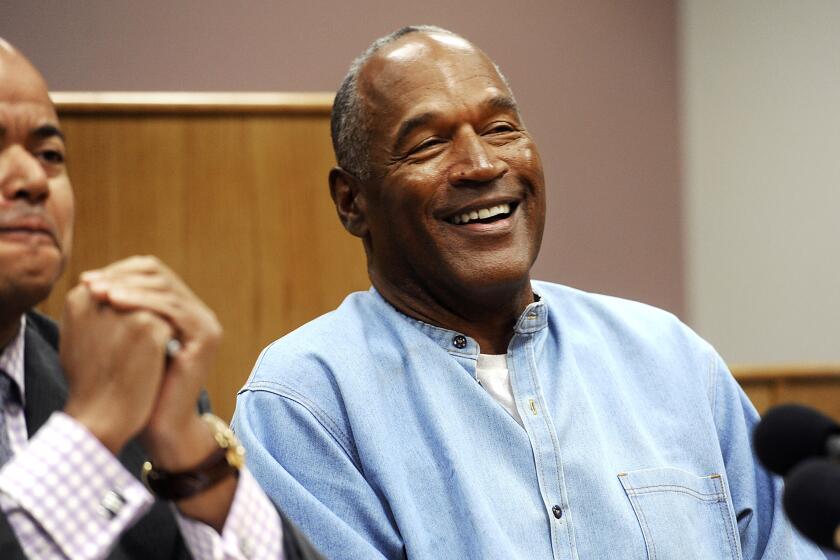Prosecutor says Bonds lied under oath to protect ‘powerful secret’
A federal prosecutor told jurors in the Barry Bonds perjury trial Thursday that the former San Francisco Giant lied under oath to protect a “powerful secret,” but Bonds’ lawyers countered that the government relentlessly pursued the home run king because he refused to be intimidated and “subservient.”
After several hours of closing arguments, a jury of eight women and four men received the case. Jurors met briefly and then decided to return for deliberations at 8:30 a.m. Friday.
Prosecutors presented about two dozen witnesses over 2 1/2 weeks to try to prove that Bonds lied to a grand jury in 2003 when he testified that he did not knowingly use performance-enhancing drugs. In a show of confidence, the defense decided not to call a single witness.
Assistant U.S. Atty. Matthew Parrella told jurors that Bonds took steroids to make him strong but could not admit it because it was too humiliating.
“He wasn’t strong. He was weak,” Parrella said. “He went into the grand jury, and he was too weak to tell the truth despite all the anabolic steroids.”
Parrella tried to shore up the credibility of prosecution witnesses, including a former aide who had a falling-out with the baseball star and a mistress whom Bonds told to “disappear” in 2003.
Even though defense lawyers chose to “mock” Kimberly Bell, Bonds’ girlfriend of nine years, “she never changed her story,” Parrella said. “She told the truth about what she observed.”
Parrella said prosecutors did not choose Bell, who testified that Bonds admitted using steroids. Bonds chose her and stayed with her “through two marriages” and controlled her by threatening to cut off her head, he said.
The prosecutor also argued that Kathy Hoskins, a Bonds friend and employee, was “rock solid” when she testified that she saw the ballplayer’s personal trainer, Greg Anderson, inject Bonds in the navel in 2002. Bonds said under oath that Anderson had never injected him.
Assistant U.S. Atty. Jeffrey Nedrow, Parrella’s partner, told jurors that Bonds had kept his steroid use secret from all but his most intimate friends because he feared it would “taint” his athletic achievements. Bonds holds the major league record for most career home runs.
Nedrow urged jurors to ask themselves whether it was “plausible” that an athlete earning $17 million a year would blithely take drugs from his personal trainer without asking questions about what they contained.
Bonds admitted to the grand jury that he took substances later identified as steroids but testified that he thought they were flaxseed oil and arthritis cream.
Nedrow also reminded jurors that other professional ballplayers testified that Anderson had supplied them with performance-enhancing drugs and admitted knowing what they were taking.
“You can infer Bonds knew,” Nedrow said.
Bonds’ lawyers spent much of their closing argument attacking the government’s tactics and motives and contending that the government’s witnesses could not be believed.
When Bonds testified before the grand jury, two “highly trained” prosecutors fired questions at him, tried to mislead him and “clearly tried to intimidate him,” Allen Ruby, Bonds’ lead lawyer, told jurors.
“A lot of the venom in the government pursuit here is because he was not intimidated,” Ruby continued. “He did not say, ‘Yes, sir’…. He was not subservient. He’s Barry.”
He said the government failed to prove that Bonds’ grand jury statements were “material” or could have influenced the panel, which eventually indicted five people associated with a Bay Area laboratory that distributed illegal performance-enhancing drugs.
“The government doesn’t get to do a gotcha,” Ruby said.
He argued that prosecutors used unreliable witnesses to corroborate other unreliable witnesses. Hoskins, the strongest of the prosecution witnesses, was trying to help her brother, Steve Hoskins, after Bonds complained to the FBI that the brother had stolen from him, the defense maintained.
“Blood is thicker than water,” Ruby said.
While Ruby was avuncular in his presentation, Cristina Arguedas, another defense lawyer, was indignant. She complained that government agents had failed to make proper reports or document evidence and withheld information from jurors.
Each of the four counts Bonds faces carries a maximum prison sentence of 10 years, though legal analysts contend that he would face a much lighter sentence, possibly even home confinement, if convicted.
More to Read
Start your day right
Sign up for Essential California for news, features and recommendations from the L.A. Times and beyond in your inbox six days a week.
You may occasionally receive promotional content from the Los Angeles Times.






